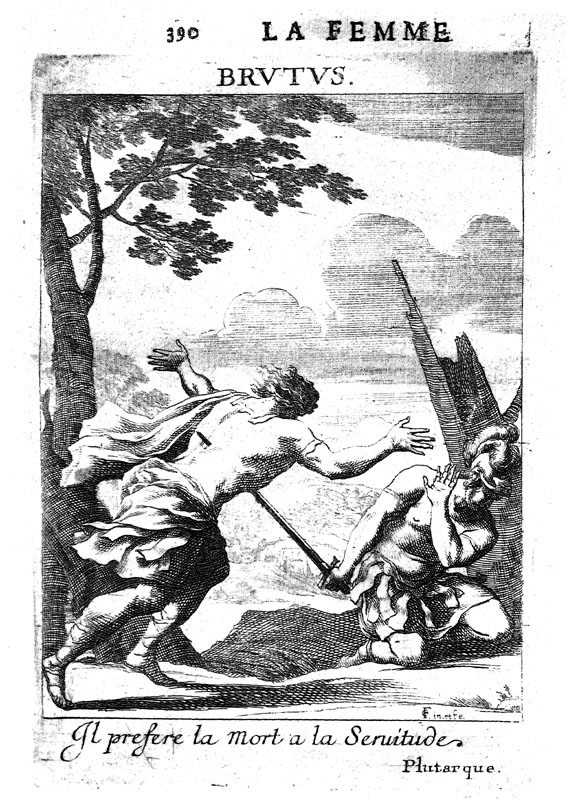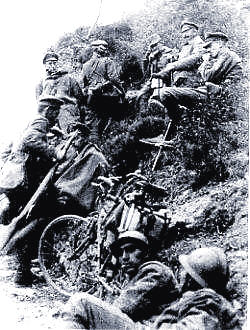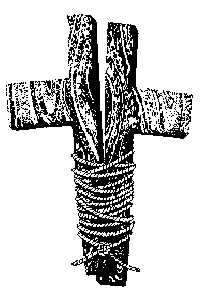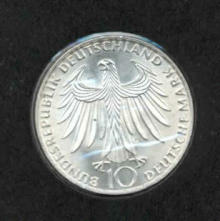NAVIGATION COLUMN
Home Page
Yahoo Groups:
History 1 Day 2
Nuremburg Data
Daily History Pages:
In Calendar Form
FAIR USE NOTICE: This site could contain copyrighted material the use of which has not always been specifically authorized by the copyright owner. We are making such material available in our efforts to advance understanding of historical, political, human rights, economic, democracy, scientific, environmental, and social justice issues, etc. We believe this constitutes a 'fair use' of any such copyrighted material as provided for in section 107 of the US Copyright Law. In accordance with Title 17 U.S.C. Section 107, the material on this site is distributed without profit to those who have expressed a prior interest in receiving the included information for research that could include educational purposes. If you wish to use copyrighted material from this site for purposes of your own that go beyond 'fair use', you could most likely need to obtain permission from the copyright owner.
|
October 23

42BC Marcus Junius Brutus, a leader in the plot to assassinate Julius Caesar, commits suicide when his republican cause is lost due to his being heavily defeated in the battle of Philippi by Marcus Antonius and Octavian. (Bradley)

1641 Rebellion in Ireland as Catholics, under Phelim O'Neil, rise against the Protestants and massacre between 40,000 to 100,000 men, women and children.

1642 English Civil War: The pivotal Battle of Edgehill takes place in the Cotswolds. Both Royalists and Parliamentarians claim victory.
1679 Meal Tub Plot: A plot by Thomas Dangerfield against James (II), Duke of York, is put into play. Dangerfield will subsequently confess the whole affair is a forgery, and is both whipped and condemned to stand in the pillory. Dangerfield dies shortly thereafter. Note: The plot got it's name because the scheme is kept in a meal-tub in the house of Mrs. Elizabeth Cellier, a midwife. (Bradley)

1694 American colonial forces led by Sir William Phips, fail in their attempt to seize Quebec.
1707 The first Parliament of Great Britain meets.

1752 Birth: Nicolas Francois Appert, French chef, chemist, confectioner; will invent food canning and the bouillon tablet.

1775 US Revolutionary War: Ignoring the opposition of Washington, Hamilton and others, the Continental Congress approves a resolution barring blacks from the army.
1783 Virginia emancipates the slaves who fought for independence during the Revolutionary War.
1790 Slaves mount a revolt in Haiti that is later suppressed.
1805 Birth: John Bartlett, lexicographer; will be best known for Bartlett's Quotations.

1812 Claude Francois de Malet, a French general, begins a conspiracy to overthrow Napoleon Bonaparte. He claims that Napoleon had died in Russia and that he, de Malet, is now commandant of Paris. He is executed six days later. (Bradley)

1835 Birth: Adlai Ewing Stevenson, US Vice President under Cleveland.
1857 Delegates from eight states meet in Nashville and organize the Southern Baptist Sunday School Union. The organization proves short-lived as it is nullified by the onset of the American Civil War. (Bradley)

1861 US Civil War: President Abraham Lincoln suspends the writ of habeas corpus in Washington, DC for all military-related cases.

1864 US Civil War: Forces led by Union General Samuel R. Curtis defeat Confederate General Stirling Price's army at the Battle of Westport, Missouri.
1873 Birth: William Coolidge, inventor of the X-ray tube.
1876 The New Orleans Mint reopens as an assay office.
1905 Birth: Felix Bloch, US physicist (Nobel 1952).

1910 Blanche S. Scott becomes the first woman aviator. Blanche is known, not as an aviator, but an aviatrix. She soars to an altitude of 12 feet over Fort Wayne, Indiana.

1915 A protest march takes place in New York, with 25,000 women demanding the right to vote.

1917 WW1: The Battle of Caporetto begins. A pivotal conflict between the Austrians and Germans, on the one hand, and the Italians, who are to suffer a devastating defeat.
1918 WW1: President Wilson insists that the United States and the Allies not negotiate an armistice with the existing military dictatorship of Germany.

1918 WW1: In Mesopotamia (Iraq), a British force under Lt. Gen. A. S. Cobbe pushes northward from Baghdad to secure the Mosul oil fields before the Turkish collapse.
1922 Andrew Bonar Law takes office as British Prime Minister. He will be replaced on 22 May 1923 , by Stanley Baldwin, making his the shortest term of office in the 20th century.
1923 Weimar: Chancellor Stresemann demands the resignation of the Communist Government in Saxony and the restoration of the authority of the Reich in Bavaria.
1929 After a steady decline in stock market prices since the peak in September, the New York Stock Exchange begins to show signs of panic.
1933 Holocaust: Martin Buber and 51 other Jewish educators are fired from their positions at German universities.
1934 The Naval Disarmament Conference is held in London. Note: This is a serious bid by Hitler to drive a wedge between the British and their European allies.

1937 Nazis and Nazi sympathizers in Danzig stage a massive pogrom.
1939 Diary of Leon Gladun: Tomorrow we're supposed to leave here [...] for Szepetowka. They say there's to be an exchange with the Germans.
1940 WW2: Hitler meets with Franco at Hendaye.
1941 Holocvaust: All Jewish emigration Nazi-occupied territory is officially halted.

1941 Church and Reich: Catholic Provost Bernhard Lichtenberg, who right through the stepped-up anti-Semitic agitation, continues to say a daily prayer for the Jews, is finally arrested. During questioning by Himmler's henchmen, the Provost asserts that the deportation of the Jews is irreconcilable with Christian moral law, and asks to be allowed to accompany the deportees as their spiritual adviser. He is sentenced to two years imprisonment for abuse of the pulpit (see November 5, 1943) (Lewy)
1942 WW2: Field Marshal Montgomery begins his attack on El Alamein. After a 5-hour, thousand-gun artillery barrage. Two British columns move forward cutting a deep salient into the German lines.
1942 WW2: The Western Task Force, destined for North Africa, departs from Hampton Roads, Virginia.

1944 WW2: The Japanese fleet fails to destroy transports landing American soldiers on the island of Leyte during the Battle of Leyte Gulf (to October 26).

1944 Church and Reich: Reich Foreign Minister Rosenberg writes to Party Secretary Martin Bormann proposing to draft the entire German clergy for forced labor because of severe manpower shortages. (Lewy)
1946 The UN General Assembly second session convenes, at an auditorium in Flushing Meadow.
1947 The NAACP's petition on racism, An Appeal to the World, is presented to the UN.
1952 The Nobel Prize for Medicine is awarded to Ukranian born microbiologist Selmart A. Waksman for his discovery of an effective treatment of tuberculosis.

1954 In Paris, an agreement is signed by Britain, England, France and USSR providing for West German sovereignty and permitting West Germany to rearm and enter NATO and the Western European Union.

1955 The Saar, an autonomous area united economically with France, votes against closer ties with Paris. It will become German territory in 1957.
1956 The Prague Spring: The ill-fated revolt in Communist Hungary starts; it will eventually be crushed by Soviet tanks.

1957 The first test firing of the Vanguard satellite launch vehicle, TV-3 is made.

1958 The USSR lends money to the UAR to build Aswan High Dam.
1958 Russian poet and novelist Boris Pasternak is awarded the Nobel Prize for literature (Dr. Zhivago) but is forced to refuse the honor because of negative Soviet reaction.
1961 The delayed Nobel Peace Prize for 1960 is awarded to Albert Lutuli, ex-president of the African National Congress.
1961 Dag Hammarskjoeld, former secretary-general of the UN, is posthumously awarded the Nobel Peace Prize.

1962 Cuban Missile Crisis: The Council of the Organization of American States (OAS) unanimously approves the US quarantine against Cuba, authorizing the US to use armed force to prevent the shipment of more offensive weapons to Cuba from the Soviet Union. In response to a letter from Soviet leader Nikita Khrushchev expressing his concern at the gravity of the crisis, President John F. Kennedy transmits a letter to Khrushchev via the Russian embassy, urging Soviet compliance with the quarantine. After sending the letter, Kennedy agrees to give Khrushchev more time by pulling the quarantine line back 500 miles. (Bradley)
1973 Watergate: President Richard Nixon agrees to turn White House tape recordings requested by the Watergate special prosecutor over to Judge John J. Sirica.

1973 The Nam: North Vietnamese negotiator Le Duc Tho refuses to accept the Nobel Peace Prize, awarded jointly to him and to US counterpart Henry Kissinger, saying there is still no peace in his country.
1973 A UN sanctioned cease-fire officially ends the Yom Kippur war between Israel and Syria.
1977 By a two-thirds majority, Panamanians vote to approve the new Canal treaties.
1978 China and Japan exchange treaty ratification documents in Tokyo, formally ending four decades of hostility.
1980 Soviet Premier Alexei Kosygin resigns, due to illness.

1983 A truck filled with explosives, driven by a Moslem terrorist, crashes into the US Marine barracks in Beirut, Lebanon. The bomb kills 237 Marines and injures 80. Almost simultaneously, a similar incident occurs at French military headquarters, where 58 die and 15 are injured.
1987 The US Senate rejects the nomination of Robert H. Bork to the US Supreme Court by a 58-42 vote.
1989 33 years after Soviet tanks crushed the Prague Spring, Hungary formally declares an end to 40 years of communist rule and proclaims itself a republic, setting the stage for creation of Western-style democracy in the East Bloc state.
1990 Ukrainian Prime Minister Vitaly Masol resigns after mass student protests, the first Soviet official of his rank to quit under public pressure.
1990 Desert Shield: Iraq announces the release of 330 French and 64 British hostages.

1991 On this Wednesday afternoon in Killeen, Texas, George Jo Hennard drives his pickup truck through the plate-glass window of Luby's Cafeteria and begins firing indiscriminately into the crowded restaurant with a semiautomatic pistol. The deranged Hennard kills 22 people and wounds 20, one fatally, before turning the gun on himself. Present in the restaurant is Suzanna Gratia (above), who narrowly escapes being shot but whose mother and father are killed. Gratia had her own gun with her that day but had left it locked in her car as required by Texas state law. After recovering from the tragedy, Gratia will become a fierce advocate of the right to carry concealed handguns in public places and lead a popular movement that results in the approval of the Texas Concealed Handgun License Act in 1995. In 1996, she will be elected to the Texas House of Representatives as Suzanna Gratia-Hupp and continue to be a vocal proponent of the right to bear arms. (Bradley)
1991 Delegates from 19 nations meeting in Paris sign a UN-brokered peace deal aimed at ending the 13-year civil war in Cambodia.
1991 The United States announces that all parties invited to the Middle East peace conference have accepted.
1994 At least 50 people, including opposition leader Gamini Dissanayake, are killed in a bomb explosion in the Sri Lankan capital Colombo.
1995 President Bill Clinton and President Boris Yeltsin, agree to a joint peacekeeping effort in Bosnia.
1995 The US Defense Department announces it is ending a program designed to help minority-owned firms secure government contracts.
1996 Bob Dole's campaign manager, Scott Reed, meets with Ross Perot and asks him to drop out of the presidential race and endorse Dole. The next day Perot responds: "No".
1998 After nine days of tense negotiations at the Wye Conference Center in Queenstown, Maryland, Israeli Prime Minister Benjamin Netanyahu and Palestinian leader Yasser Arafat sign an agreement to revive the stalled Middle East peace process; the Wye River land-for-security agreement. (Bradley)
1998 Dr. Barnett Slepian, an obstetrician who performs abortions, is shot to death by a sniper who fires a bullet through a window of Slepian's home in Amherst, New York. He had been the target of antiabortion protesters for years. Note: The murder is perpetrated to defend the Biblical injunction, 'Thou shalt not kill.'
2000 US Secretary of State Madeline Albright meets with North Korean leader Kim Jong Il and attends a huge spectacle of 100,000 performers honoring her host.
2001 US-led forces maintain their intense pressure on the Taliban, pounding positions around the Afghan capital of Kabul and the militia's southern stronghold of Kandahar for the 17th consecutive day.
2001 Vice President Dick Cheney is given the International Republican Institute's 2001 Freedom Award. He promises the war against terrorism being waged in Afghanistan will be 'relentless'.
2001 UK Home Secretary David Blunkett faces tough questioning from MPs over his proposed antiterrorism laws.

2001 Two postal workers from the Brentwood postal facility in Washington are confirmed to have died from inhalation anthrax. Many postal employees ask why they were not treated and tested earlier, and why Capitol Hill staffers apparently received priority attention. Another New Jersey postal worker is confirmed with anthrax. Anthrax is confirmed in a Washington facility that sorts White House mail. Later President Bush emphatically tells reporters, "I don't have anthrax."

2001 The FBI releases photographs of the letters, confirmed to carry anthrax spores, that were sent to Tom Daschle, Tom Brokaw, and the Editor of the NY Post.
2001 US Secretary of State Colin Powell meets Israeli Minister Shimon Peres and asks Israel to withdraw from Palestinian controlled areas. Earlier Israel tells US that withdrawal demands are "out of line."
2001 The IRA promises to disarm "to save the peace process" in Northern Ireland.
2002

2003

2004

2004

2008

^ Top of Page ^
Click Here to email the Webmaster of this site.
Web Page Design by Nathan
This page was last updated on October 20, 2005
|
